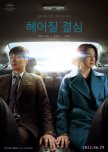Masterpiece cast in silky noir.
The ultra-violence of the revenge trilogy feels distant when the Korean visionary Park Chan Wook serves delicious romance of the absolute highest class.
The irresistible scent of classic noir hangs like a dense fog over Park Chan Wook's latest opus. Decision to Leave (2022) undeniably has films like Double Indemnity (1944) and Vertigo (1958) to thank, but at the same time, Park Chan Wook is refreshingly unique in his filmmaking and voice as usual. It is not long before what is initially very "Hitchcockian" and familiar is taken in completely unexpected directions.
The story begins in an accident investigation led by the chronically melancholic police officer Jang Hae Joon (Park Hae Il). A middle-aged climber appears to have fallen from the mountain he was climbing and died instantly when he hit the ground. Most of Hae Joon's colleagues shrug their shoulders and want to shrug it off as quickly as possible, while he himself begins to turn the magnifying glass on the deceased's mysterious widow, Chinese Song Seo Rae (Tang Wei). Her cold nonchalance about what happened and her murky background means that Hae Joon is no longer so sure that her fate was an accident. The instant chemistry that develops between the two further complicates the case.
So far it feels like movies I've seen before but every minute of playtime me further away from them. What could steer towards a conventional investigative thriller instead becomes something far more dreamy and sublime. What generally results in something cold and hard instead turns into something warm and silky. With each passing scene, it becomes increasingly clear that the murder mystery and its "whodunit" question is completely subordinate to the central relationship and that it is a love story unfolding on the big screen, albeit a strange one. The corpses that keep turning up are just icing on a cake of passion and longing. Park Chan Wook's transformation into bloody romantic (something already noticed in 2016's The Handmaiden) is total, and I love it.
Given that's the direction Park Chan Wook chooses, it's Tang Wei and Park Hae Il that everything hinges on, because if you don't buy their almost Phantom Thread twisted romance, everything else falls like a house of cards. Fortunately, there are sparks about them from the first frame they share and it is with ease that one capitulates to their restrained "courtship" of each other. Hae Il's portrayal of someone stuck on autopilot in career and marriage only to gently thaw back to life is utterly devastating, and Tang Wei's multi-layered, vulnerable and utterly unique femme fatale interpretation will carry with me for a long time.
As always with Park Chan Wook's filmmaking, he maximizes the visual potential of every frame. Here he is more playful than in his previous works and allows everything from smartphones to GPSs to merge with the visual language and the result feels as hypermodern as it does classic. Aesthetically, he continues on the trail he opened with 2018's The Little Drummer Girl, allowing both set design and costuming to rise far beyond realism. There are strong reds, strong blues and strong greens, almost to the point that Pedro Almodóvar feels like a possible source of inspiration. Few filmmakers can pull off a visual feast of this breathtaking caliber.
When the incredible finale (incidentally the obvious peak of a film that conquers the epithet masterpiece in every scene) is over and the credits roll, I can't help but think of Michael Gambon's narration in the Coen brothers' Hail, Caesar! (2016) and how he describes a film- "A potion of balm for the ache of a toiling mankind". That's exactly what Decision to Leave is, a soft and healing balm for the heart, brain and soul.
The irresistible scent of classic noir hangs like a dense fog over Park Chan Wook's latest opus. Decision to Leave (2022) undeniably has films like Double Indemnity (1944) and Vertigo (1958) to thank, but at the same time, Park Chan Wook is refreshingly unique in his filmmaking and voice as usual. It is not long before what is initially very "Hitchcockian" and familiar is taken in completely unexpected directions.
The story begins in an accident investigation led by the chronically melancholic police officer Jang Hae Joon (Park Hae Il). A middle-aged climber appears to have fallen from the mountain he was climbing and died instantly when he hit the ground. Most of Hae Joon's colleagues shrug their shoulders and want to shrug it off as quickly as possible, while he himself begins to turn the magnifying glass on the deceased's mysterious widow, Chinese Song Seo Rae (Tang Wei). Her cold nonchalance about what happened and her murky background means that Hae Joon is no longer so sure that her fate was an accident. The instant chemistry that develops between the two further complicates the case.
So far it feels like movies I've seen before but every minute of playtime me further away from them. What could steer towards a conventional investigative thriller instead becomes something far more dreamy and sublime. What generally results in something cold and hard instead turns into something warm and silky. With each passing scene, it becomes increasingly clear that the murder mystery and its "whodunit" question is completely subordinate to the central relationship and that it is a love story unfolding on the big screen, albeit a strange one. The corpses that keep turning up are just icing on a cake of passion and longing. Park Chan Wook's transformation into bloody romantic (something already noticed in 2016's The Handmaiden) is total, and I love it.
Given that's the direction Park Chan Wook chooses, it's Tang Wei and Park Hae Il that everything hinges on, because if you don't buy their almost Phantom Thread twisted romance, everything else falls like a house of cards. Fortunately, there are sparks about them from the first frame they share and it is with ease that one capitulates to their restrained "courtship" of each other. Hae Il's portrayal of someone stuck on autopilot in career and marriage only to gently thaw back to life is utterly devastating, and Tang Wei's multi-layered, vulnerable and utterly unique femme fatale interpretation will carry with me for a long time.
As always with Park Chan Wook's filmmaking, he maximizes the visual potential of every frame. Here he is more playful than in his previous works and allows everything from smartphones to GPSs to merge with the visual language and the result feels as hypermodern as it does classic. Aesthetically, he continues on the trail he opened with 2018's The Little Drummer Girl, allowing both set design and costuming to rise far beyond realism. There are strong reds, strong blues and strong greens, almost to the point that Pedro Almodóvar feels like a possible source of inspiration. Few filmmakers can pull off a visual feast of this breathtaking caliber.
When the incredible finale (incidentally the obvious peak of a film that conquers the epithet masterpiece in every scene) is over and the credits roll, I can't help but think of Michael Gambon's narration in the Coen brothers' Hail, Caesar! (2016) and how he describes a film- "A potion of balm for the ache of a toiling mankind". That's exactly what Decision to Leave is, a soft and healing balm for the heart, brain and soul.
Was this review helpful to you?

























